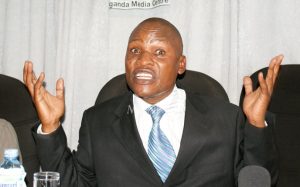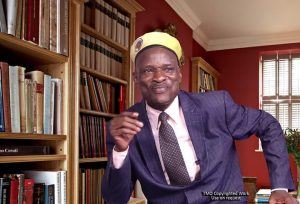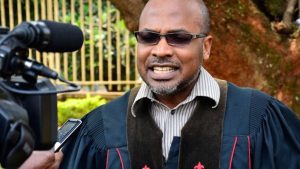
Mr. Richard Byarugaba, managing director of the National Social Security Fund (NSSF), announced yesterday that they do not have enough cash to pay savers eligible for mid-term benefits.
Mr. Byarugaba dropped the bombshell while testifying before Parliament’s Gender Committee. Which is currently gathering public input and scrutinizing the NSSF (Amendment) Bill, 2021.
Among other things, the proposed law states that any Fund member aged 45 and up who has saved for at least a decade is eligible to withdraw up to 20% of their savings.
Mr. Byarugaba, who told this newspaper on August 6 and again on October 4 that they would be able and ready to start paying mid-term benefit claimants this or next month, told legislators yesterday that the Fund does not have enough cash.
“The current process cannot permit us to implement a mid-term access as provided for [in] the policy…We are in the process of changing the system…Our target is to do that by the beginning of October,” he told this newspaper in August
This occurred shortly after President Museveni and NSSF stakeholders reached an agreement on changes to the first version of the NSSF (Amendment) Bill, 2019. Before Speaker Jacob Oulanyah terminated it and other Bills under consideration on technical grounds.
NSSF Bill Amendment
The decision gave birth to the successor NSSF (Amendment) Bill, which replicated the previous version’s contents, and Parliament committed to hastening its passage.
Following the back-and-forth, Mr Byarugaba told this newspaper on October 4: “On November 1, we will have a new system and if the law is passed by then, we will be able to make those payments.”
This occurred shortly after President Museveni and National Social Security Fund (NSSF) stakeholders reached an agreement on changes to the first version of the NSSF (Amendment) Bill, 2019, before Speaker Jacob Oulanyah terminated it and other Bills under consideration on technical grounds.
However, while testifying before Parliament’s Gender Committee at the Serena Kampala Hotel alongside other top Fund staff, Mr Byarugaba stated:
“As for the money, that is another question. This year we were going to pay Shs932 billion [in interests to members], but because of this new [NSSF Amendment Bill] law, we are going to pay an additional Shs902 billion. We are expecting Shs120 billion per month [in remittances by employers]; so, that money [for mid-term access] is not all available as soon as the law passes. We do not have the Shs1.5 trillion [for interests and mid-term benefit payments].”
Both the NSSF director and Finance Minister Matia Kasaija, who is the political overseer of the workers’ money, have previously opposed mid-term access. Claiming that it would drain the Fund and reduce interest payable to members.
The Fund paid savers 12.15 percent above-inflation interest after its income increased by 25% to Shs1.8 trillion. In the previous fiscal year and its asset base increased from Shs13.3 trillion to Shs15.5 trillion. Owing to increased contributions from more compliant employers and growing confidence in the Fund.
NSSF’s interest income increased by Shs200 billion during the fiscal year 2020/2021. Dividend income increased by about Shs12 billion, and real estate income increased by Shs53.5 billion, up from Shs11.1 billion.
Mr. Byarugaba
Despite the Fund’s volatile performance, Mr. Byarugaba told MPs on the Gender Committee yesterday that the Fund’s funds have already been invested and there is no cash available to pay mid-term benefit claimants if the National Social Security Fund (NSSF) Amendment Bill is passed.
“As soon as the law comes into place, this money will become due. We do not want to be caught with our pants down,” he said in reference to the 9,300 eligible NSSF members whose total claims gross Shs902b.
Rather than focusing on the 20% mid-term pay-out, Mr. Byarugaba said the discussion should include expanded benefits proposed in the Bill. Such as voluntary savings beyond 15% and mandatory savings by all private sector employees. Because 95 percent of NSSF members have less than Shs50 million in savings, and 70 percent have less than Shs10 million, meaning they could receive as little as Shs2 million in mid-term pay.
“What is Shs2 million going to do for you? 20 percent is not the solution, we need boosters to make sure that people save more money,” he argued.
Ms Linda Irene Mugisha, the Fort Portal City MP and member of the Gender Committee, responded by proposing that the percentage of savings available to a member under mid-term access be increased from 20% to 30%.
Mr. Joab Businge
Mr. Joab Businge, Masindi Municipality MP, questioned why a Fund worth Shs15 trillion finds it difficult to raise Shs1.6 trillion for both interest and mid-term benefits.
“Even if you are doing investment, we shouldn’t invest all the money to support the economy and forget the primary person [the NSSF contributor],” he told the Fund leadership, adding, “People are just on the edge waiting for the whistle. Many savers are waiting for this money.”
The demand for mid-term access gained currency during the first Covid-induced lockdown last year. When most people, including savers, were unexpectedly laid off when their employers folded or downsized due to the pandemic’s disruption of livelihoods and businesses.
Mr. Byarugaba proposed that the new law empower the Finance Minister. As the Fund’s political supervisor, to issue a statutory instrument specifying how the money for the mid-term pay-out will be raised.
It was proposed that final benefits be taxed in both the notes to the revised NSSF (Amendment) Bill, 2021. And the Certificate of Financial Implication for it issued by the Ministry of Finance. A proposal that sparked outrage and prompted Attorney General Kiryowa Kiwanuka to say that the references were a “error” by drafters in his chamber.
Timeline
The committee members yesterday demanded that the minister issue the statutory instrument on a specific timeline to avoid inordinate delays for eligible NSSF members to access 20 percent of their savings mid-term.
Despite the fact that the House is in recess until next Tuesday, the committee met at the Serena Hotel across the street from Parliament Building. The committee chairperson, Ms. Flavia Kabahenda, stated that they are sitting in hotels, including Africana. Because the Committee Rooms at Parliament Building are insufficiently large to accommodate the 32 lawmakers on the Committee. As well as members of the public making representations about the Bill.
Also Read:
No Time To Die Claims the Highest Chart Ever For All Bond Movies
OS Suuna Tells Journalists To Stop Playing His Music If They Want
Tiwa Savage Speaks About leaked S€x tape.
Government to give 1,600 students study loan.








